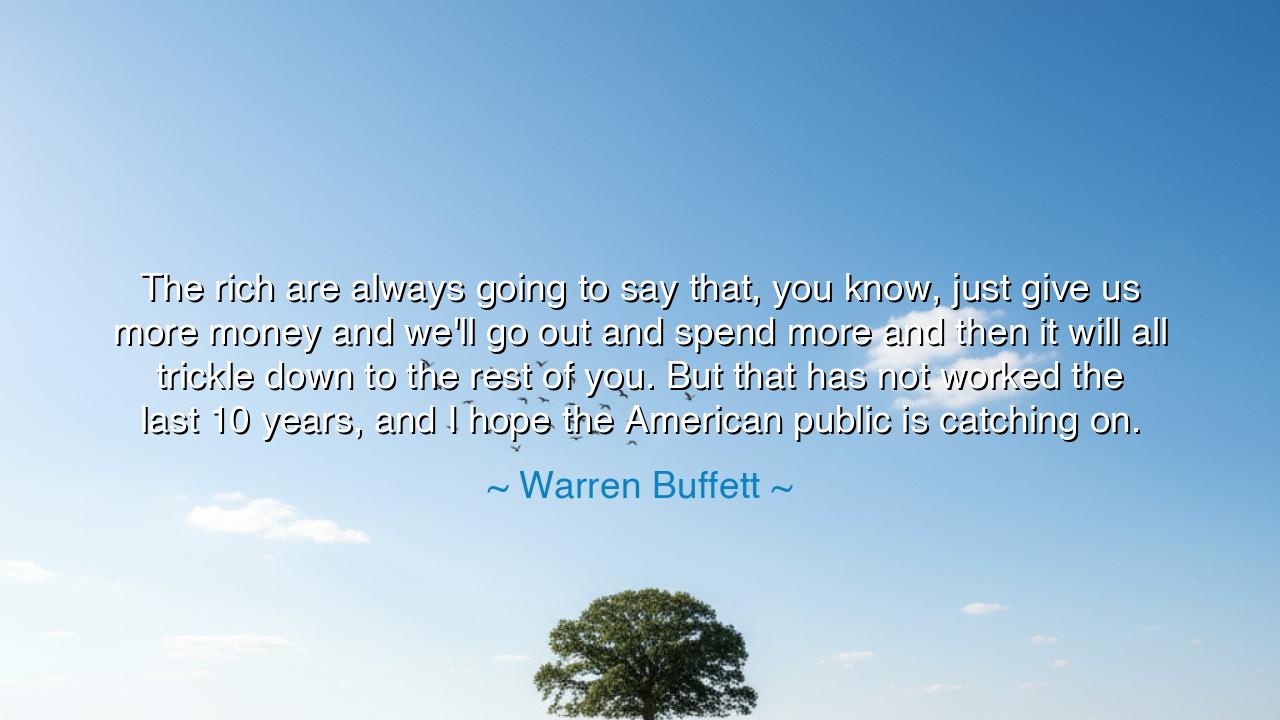
The rich are always going to say that, you know, just give us
The rich are always going to say that, you know, just give us more money and we'll go out and spend more and then it will all trickle down to the rest of you. But that has not worked the last 10 years, and I hope the American public is catching on.






“The rich are always going to say that, you know, just give us more money and we’ll go out and spend more and then it will all trickle down to the rest of you. But that has not worked the last 10 years, and I hope the American public is catching on.” Thus spoke Warren Buffett, the Oracle of Omaha, whose wealth is matched only by his candor. These words are not the complaint of a cynic, but the admonition of a sage who has seen the great cycles of prosperity and decline. In them, Buffett calls out the illusion of the trickle-down promise—the idea that enriching the few will somehow uplift the many. His voice, calm yet thunderous with truth, pierces through the gilded rhetoric of economic power to remind humanity that wealth without justice is no blessing, and that prosperity hoarded at the top cannot nourish the roots below.
The origin of Buffett’s quote lies in his deep understanding of the American economy, and the myth that has long guided it: that when the rich thrive, their abundance naturally spills over to those who labor beneath them. This idea—popularized in the late 20th century as trickle-down economics—was born of faith in markets but has too often served as a shield for greed. For decades, the promise was repeated: reduce taxes on the wealthy, loosen restraints on corporations, and the blessings of growth will reach all. Yet Buffett, a man who knows the dance of capital better than most, has seen how little of that promise is fulfilled. The wealth, instead of flowing downward, rises like mist, evaporating into the rarefied air of the elite.
Through his words, Buffett warns not merely of inequality, but of illusion—the illusion that self-interest alone can build a just society. He reminds us that markets are not divine forces but human creations, shaped by moral choices. The rich will always claim that what benefits them will benefit all; it is in their interest to believe it. But history, he says, tells another story. When the fruits of labor are concentrated in too few hands, civilizations falter. When the worker’s sweat no longer feeds his own table, when the merchant’s gain is not matched by the community’s well-being, then wealth ceases to be the servant of humanity and becomes its master.
The ancients knew this truth long before Buffett. Aristotle warned that extreme inequality breeds revolution, for no state can endure when the gap between rich and poor becomes unbridgeable. Rome, too, once learned this bitter lesson. In her early days, she was strong, a republic of citizens bound by shared purpose. But as the centuries passed, her gold flowed upward—to patricians, landlords, and generals—while the common people sank into poverty. The promise that wealth would trickle down proved false, and in its place came unrest, corruption, and the slow decay of empire. The wealth of Rome became her weakness, for it no longer served the people—it served itself.
Buffett’s words, though born of modern finance, echo the same eternal warning. He speaks not as an enemy of the rich—he is one of them—but as a guardian of balance. He understands that prosperity is not measured by how high the top can rise, but by how wide the foundation can grow. When wealth becomes a tide that lifts only a few ships, the harbor of society grows shallow and dangerous. True economic strength comes not from concentration but from circulation—from wages that sustain families, from opportunities that awaken potential, from a system that rewards labor as much as capital.
Consider, in our own time, the workers who labor long hours yet remain one paycheck from ruin, while corporate profits reach heights unseen. Buffett’s challenge to the American public is a call to awaken—to see through the pleasant fiction that the generosity of the powerful will save them. He urges the people to remember that democracy itself demands vigilance: that wealth must serve the common good, or it will consume it. For if the people surrender their belief in fairness, the heart of a nation grows cold, and freedom itself becomes a commodity for sale.
The lesson, then, is clear and enduring: justice must guide prosperity. To those who hold wealth, Buffett’s words are a summons to humility—to invest in the world that made them, to build not only empires of money but legacies of good. To those who labor without privilege, they are a reminder of worth—that the dignity of work is the truest engine of progress. The future will not be saved by what trickles down, but by what is built up—from the ground, from the people, from the heart.
And so, let us take Buffett’s words as both mirror and torch: a mirror reflecting the failures of greed, and a torch lighting the path toward renewal. Let us remember that an economy, like a garden, thrives only when all are nourished. The wealth of one man, if hoarded, is dust; but the wealth of a people, shared in justice, becomes the foundation of a civilization that endures.






AAdministratorAdministrator
Welcome, honored guests. Please leave a comment, we will respond soon